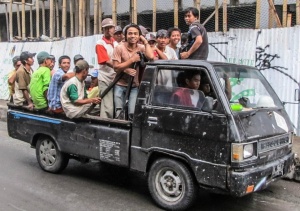
Work ute
In the context of sustainability, three connected high-level systems are referred to:
- Economy,
- Society, and
- Environment.
In the developed world, and much of the developing world, it is the economy that ordinarily dominates the headlines, with economic and financial objectives driving most decision-making.
Social and environmental issues are taken into account in decision-making – generally to reflect legal obligations and regulations, rather than as a reflection of ethical consideration. Even so, trade-offs that result in some some social or environmental impacts are commonplace, and made in the interests of maintaining and growing economic performance as the primary and most important objective.
Whilst these trade-offs may each only result in small encroachments on the environment or community interests, the consistency of this approach is systematic – resulting in a paradigm that might be likened to ‘death by a thousand cuts’.
In this session, we’ll look at how to define sustainability and sustainable development in a way that can inform and enable decision-making that creates a carefully designed pathway towards genuine success. Based on an understanding of the relevant systems: economic, social and environmental – we need an identified goal that will deliver success across all three of these systems.
In this learning pathway you will:
- Explore the definitions of sustainable development and sustainability.
- Obtain understanding about how the social system works, and why meeting human needs sits at the very core of sustainability.
In the context of sustainability, three connected high-level systems are referred to:
In the developed world, and much of the developing world, it is the economy that ordinarily dominates the headlines, with economic and financial objectives driving most decision-making.
Social and environmental issues are taken into account in decision-making – generally to reflect legal obligations and regulations, rather than as a reflection of ethical consideration. Even so, trade-offs that result in some some social or environmental impacts are commonplace, and made in the interests of maintaining and growing economic performance as the primary and most important objective.
Whilst these trade-offs may each only result in small encroachments on the environment or community interests, the consistency of this approach is systematic – resulting in a paradigm that might be likened to ‘death by a thousand cuts’.
In this session, we’ll look at how to define sustainability and sustainable development in a way that can inform and enable decision-making that creates a carefully designed pathway towards genuine success. Based on an understanding of the relevant systems: economic, social and environmental – we need an identified goal that will deliver success across all three of these systems.
Objectives
In this learning pathway you will:
Content is available under the
Creative Commons Attribution Share Alike License.
Privacy Policy | Authors